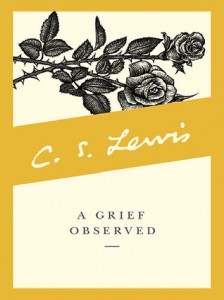 C.S. Lewis joined the human race when his wife, Joy Gresham, died of cancer. Lewis, the Oxford don whose Christian apologetics make it seem like he's got an answer for everything, experienced crushing doubt for the first time after his wife's tragic death. A Grief Observed contains his epigrammatic reflections on that period: "Your bid--for God or no God, for a good God or the Cosmic Sadist, for eternal life or nonentity--will not be serious if nothing much is staked on it. And you will never discover how serious it was until the stakes are raised horribly high," Lewis writes. "Nothing will shake a man--or at any rate a man like me--out of his merely verbal thinking and his merely notional beliefs. He has to be knocked silly before he comes to his senses. Only torture will bring out the truth. Only under torture does he discover it himself." This is the book that inspired the film Shadowlands, but it is more wrenching, more revelatory, and more real than the movie. It is a beautiful and unflinchingly honest record of how even a stalwart believer can lose all sense of meaning in the universe, and how he can gradually regain his bearings.
C.S. Lewis joined the human race when his wife, Joy Gresham, died of cancer. Lewis, the Oxford don whose Christian apologetics make it seem like he's got an answer for everything, experienced crushing doubt for the first time after his wife's tragic death. A Grief Observed contains his epigrammatic reflections on that period: "Your bid--for God or no God, for a good God or the Cosmic Sadist, for eternal life or nonentity--will not be serious if nothing much is staked on it. And you will never discover how serious it was until the stakes are raised horribly high," Lewis writes. "Nothing will shake a man--or at any rate a man like me--out of his merely verbal thinking and his merely notional beliefs. He has to be knocked silly before he comes to his senses. Only torture will bring out the truth. Only under torture does he discover it himself." This is the book that inspired the film Shadowlands, but it is more wrenching, more revelatory, and more real than the movie. It is a beautiful and unflinchingly honest record of how even a stalwart believer can lose all sense of meaning in the universe, and how he can gradually regain his bearings.This work chronicles Lewis' struggle to come to terms with the death of his wife. Because it comes from his private journals, it may not seem as "polished" as some of his other writings. Personally, I appreciate the way it reveals the innerworkings of a very emotional and private man.
In contrast to many works, this book doesn't try to simplify grief, justify it, or dance around the issue with pat observations or cheery reminders. Instead, it dares to question those very tactics. Lewis allows himself to feel a broad range of emotions, including doubt and great despair. I love this quality in Lewis: he is one of the few Chrisitian writers who is brutally honest about his fears and anger. His writings allow that God is big enough to handle our toughest questions.
This little book is full of images and ideas that will stay with you long after you've finished it. Lewis takes feelings that you can't quite pinpoint and eloquently puts them into words. As I read the book, I kept thinking to myself "Yes, THAT'S what I feel too!" Misery does love company, and Lewis is excellent company.
As usual, Lewis is full of astute observations and points to ponder, but don't expect a bunch of clean and pretty answers. At the end, his grief is still very much a work in progress, which is definitely how it has been in my life....a journey Read More...

No comments:
Post a Comment